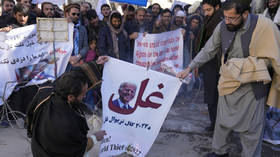Colonialism 2.0: How the US and UK take what they want from 'lesser powers'

There is an old joke which still has resonance. A child asks his parent, “Why are there pyramids in Egypt?” The parent answers, “Because they were too big to take to Britain.” Of course, many a true word is spoken in jest. Indeed, there is an apocryphal story that back in the day when Vladimir Lenin was in exile in London, he would enjoy taking friends to the British Museum and explaining to them how and from what far-flung lands all the antiquities there were stolen.
One might have thought that these days of colonial plunder had ended, but one would be very wrong. Current examples abound. A notable one is, of course, the freezing by the US of $7 billion from the Afghanistan treasury – monies the US continues to hold even as it watches Afghans begin to die from starvation. Apparently, the US believes that, after laying waste to Afghanistan through 20 years of war and, even before that by supporting the mujahideen terrorists, it is entitled to some compensation. This upside-down type of reasoning abounds in the minds of those in the West who simply believe they can take whatever they wish.
Similarly, the US is now plundering Syria – another country utterly devastated in no small part by Washington-backed militants in a campaign to overthrow the elected president – of most of its oil, even as Syria suffers from severe energy blackouts. Thus, according to the Syrian Oil Ministry, “US occupation forces and their mercenaries,” referring to the US-backed Syrian Democratic Forces (SDF), “steal up to 66,000 barrels every single day from the fields occupied in the eastern region,” amounting to around 83% of Syria’s daily oil production.
According to the ministry’s data, the Syrian oil sector has incurred losses of “about $105 billion since the beginning of the war until the middle of this year” as a result of the US oil theft campaign.
Additionally, the statement added that alongside the financial losses incurred by the oil sector were “losses of life, including 235 martyrs, 46 injured and 112 kidnapped.”
One of the biggest heists the US has carried out is against Russia. After the launch of Russia’s military operation in Ukraine, the US seized an incredible $300 billion of Russian treasury funds which were deposited abroad. This was done, of course, without any due process, and to the great detriment of the Russian people – and with barely a critical word from Western pundits.
The US treatment of Venezuela abounds with other examples. As I write these words, the US is maneuvering to seize a commercial 747 airliner from Venezuela on the grounds that it once belonged to an Iranian airline which had some connection to Iran’s Revolutionary Guard Corps (which Washington has designated as terrorists) – which might sound like a tenuous justification, but the US really needs no reason. And this is simply the tip of the iceberg. The US has already seized Venezuela’s biggest single source of revenue – its US-based oil company CITGO – and is now in the process of selling off this company in pieces, even as Washington lifts restrictions on Venezuelan oil to shore up its own economy. The UK, meanwhile, has decided to keep over $1 billion in gold which Venezuela naively deposited in the Bank of England for safe-keeping. To add insult to injury, the US continues to criticize Venezuela for the hardships its people endure as a direct consequence of this plunder.
Meanwhile, the US continues to persecute Colombian businessman Alex Saab for trying to obtain food and medicine for the Venezuelan people, denied such amenities by US sanctions. Saab was captured at the behest of the US in Cabo Verde in 2020 as he was flying to Iran to negotiate a deal for humanitarian supplies, including medicine to confront the coronavirus pandemic, on a mission he was employed to perform by Caracas. Saab has since been removed to a federal prison in Miami, Florida, despite the lack of an extradition treaty between the US and Cabo Verde, and he continues to languish in prison as the wheels of US 'justice' turn at a snail’s pace to resolve his case. In short, not only has the US freely stolen from Venezuela, but it is also going to great lengths to stop those who try to acquire the basic necessities for the Venezuelan people.
All of this illustrates that colonial habits die hard, and the US is always ready to turn to the tried and trusted traditions of plunder – whether to dig itself out of one of the worst economic crises in years, or to coerce other nations to serve its own geopolitical interests. The fact that the US is allowed to get away with this demonstrates that in the Washington-imposed 'rules-based order' rule of law is nothing but a tool employed by the mighty to keep the weak down.
The statements, views and opinions expressed in this column are solely those of the author and do not necessarily represent those of RT.














